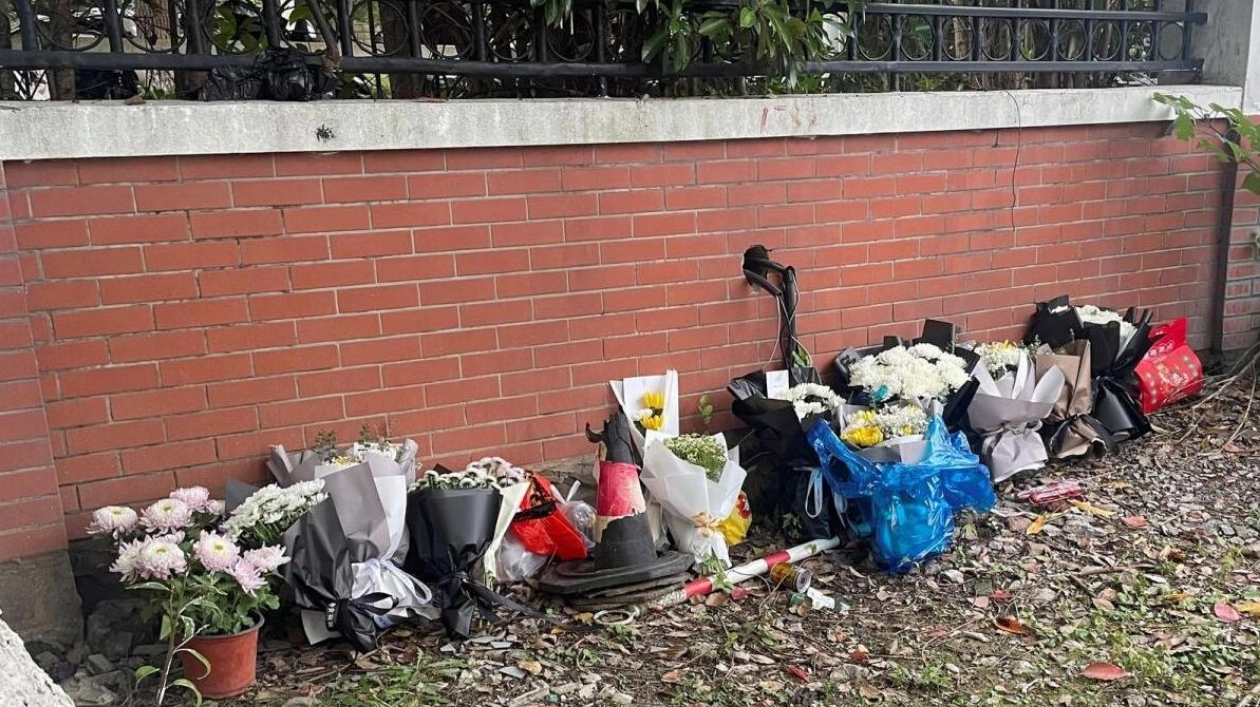Floral tributes are placed near an entrance to the Wuxi Vocational College of Arts and Technology following a knife attack, in Wuxi, Jiangsu province, China, on November 17, 2024. — Reuters
Two high-profile mass killings and a car crash at a primary school in just over a week are raising questions about how well-equipped China is to deal with the stresses of a slowing economy and related mental health issues. Since November 11, China has reeled under news of a driver reportedly angry at his divorce settlement killing 35 people by ramming his car into a crowd in Zhuhai; a former student on a stabbing rampage at a vocational college in Wuxi killing eight; and a car ploughing into a crowd of schoolchildren and pedestrians in the city of Changde on Tuesday. In the Changde case, it was not clear if the incident was caused deliberately. However, police said they had arrested the driver and investigations were in progress.
The events have led to a spike in worries about the overall health of society in China, where mass casualty attacks have occurred with alarming regularity throughout 2024. In the Zhuhai and Wuxi cases, brief statements made public by police about the suspects indicate these attacks were perpetrated by men lashing out against unrelated bystanders after suffering an economic loss. As the economy slows, employment opportunities are more precarious and fewer people are being lifted up by China's long-running economic miracle. The repercussions on mental health from such economic pressures are growing, experts say.
George Magnus, associate at Oxford University's China Centre and the author of Red Flags: Why Xi's China is in Jeopardy, says the spate of mass casualty incidents in China "speak to a pattern, rather than an aberration". Research by the Washington-based Centre for Strategic and International Studies in July identified a widespread perception in China that lack of success was attributable to unfairness and systemic causes.
"I think this goes a long way in explaining the social and industrial malaise evident in the spate of incidents, and sends out warning signals about the state of society," Magnus said. Xiaojie Qin, a Beijing-based psychotherapist and director at mental health non-profit CandleX, says that a pervasive sense of societal unfairness and disparity can lead in extreme cases to violence against random bystanders.
"Some people who were left behind and socially and economically more marginalized can feel they are not being treated fairly and some people who don't have enough emotional regulation, they have outbursts, sometimes violent outbursts," she said. China's official crime statistics show that its rates of violent crime are much lower than global averages. But the recent spate of incidents have raised questions about public safety in China, where citizens have long been proud of streets safe from violence.
The widespread censorship of discussion around the attacks has also appeared to heighten concerns as more people question the veracity of information they are receiving from official sources, analysts said. "It can exacerbate societal fears and distrust of the government within China, particularly if seemingly random, large-scale violent incidents persist as they have this year," said Drew Thompson, a senior fellow at the S. Rajaratnam School of International Studies in Singapore.
Qu Weiguo, a Fudan University professor, said the recent cases of "indiscriminate revenge against society" in China had some common features: disadvantaged suspects, many with mental health issues, who believed that they had been treated unfairly and who felt they had no other way to be heard. In an essay posted, then quickly censored, on social media Qu wrote that while counselling support could ease the problem, better ways of upholding individual rights could also provide an outlet for the aggrieved.
"The lack of access to mental health services is one reason disaffected people resort to violence, but the lack of an independent legal system that protects individuals' rights over the interests of the party or government results in a lack of trust and faith in the courts," Thompson added. According to Sami Wong, a psychotherapist and managing director of 3Drips Psychology, a research firm, China has responded to higher incidences of psychological distress in recent years — for example stemming from the Covid-19 pandemic — with increased investments in mental health infrastructure.
But while many qualified therapists have emerged in China, people remain reluctant to reach out for help, more than elsewhere in the world, because of what they see as the stigma attached to mental health issues, she said. "A lot of people still have this social stigma about seeking therapeutic help. So even though the resources are there, they're very reluctant to use it," she said.
Source link: https://www.khaleejtimes.com






